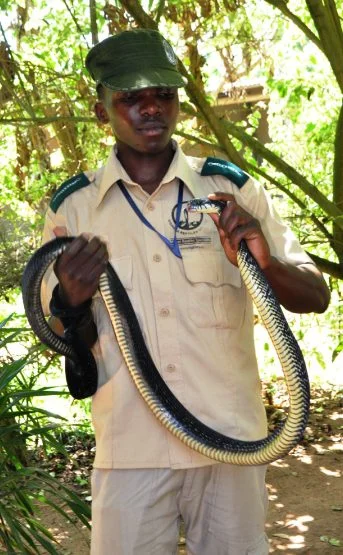Snakes are among the most feared creatures on the planet. Biblically, they are seen as enemies to humanity, often condemned to death upon encounter. Yet Yasin Kazibwe, known as Mr. Cobra, stands out as a rare individual who has embraced the art of snake and reptile husbandry.
Kazibwe is the founder of Uganda Reptile Village, a popular tourist attraction where reptiles are not just his passion but also his livelihood. Located about 1.5 kilometers off Entebbe Road, this sanctuary spans roughly four acres and showcases over 48 species of snakes and other reptiles, valued at millions of shillings.
During our visit, Kazibwe effortlessly interacted with the snakes, making it easy to forget their potentially harmful nature. However, he emphasizes the importance of staying calm and quiet to enjoy the experience fully.
How It All Began
Kazibwe’s fascination with snakes began in 1998 when he worked with Musimenta, who exported live snakes to Europe. Concerned about the impact of this trade on Uganda’s snake population, Kazibwe initially felt powerless due to his age. However, his passion blossomed when he connected with snake experts during a study leave in Tanzania. There, he met Jackson Erickson, who taught him how to handle reptiles for conservation and income.
When Kazibwe returned, he proposed to Musimenta that they stop exporting snakes and instead focus on breeding them locally. This would help prevent species extinction and restore ecological balance. Unfortunately, his boss dismissed the idea, leading Kazibwe to resign.
In 2003, he, along with 19 youths, established Uganda Reptile Village as a Community Based Organization (CBO), regulated by the Uganda Wildlife Authority (UWA). Kazibwe recognized that Bununu, the village’s location, was a habitat for snakes often killed by locals. “We found dead snakes every kilometer,” he recalls, prompting him to contact UWA for conservation support.
Today, the sanctuary is home to various species, including Gabon vipers, cobras, pythons, and more, as well as other reptiles like a 118-year-old tortoise and crocodiles.
Starting from Scratch
Kazibwe began his venture with just Sh500, which he used to buy a pen and paper to draft his project idea, mission, and objectives. He also purchased water for the young reptiles he was keeping in containers. His well-crafted proposal eventually secured a loan from Wild Frontiers, where he previously worked.
Financial Success
Kazibwe and his manager, Michael Bakiddawo, acknowledge that the Reptile Village attracts a steady stream of local and international visitors, though they refrain from disclosing specific earnings. On weekends, the facility can welcome over 100 visitors, and schools often organize group visits.
The entry fees vary based on residency, with non-East African adults paying Sh15,000 and children Sh10,000, while East African residents pay Sh10,000 for adults and Sh5,000 for children. Ugandans enjoy even lower rates, paying Sh5,000 for adults and Sh3,000 for children.
Expanding Horizons
In addition to reptiles, the facility offers activities like fishing, canoe cruising, and bird watching along the man-made River Kazibwe, which stretches about 3 kilometers from Lake Victoria. Fishing costs Sh20,000, pedal cruising is Sh2,000, and bird watching is free.
Achievements
Kazibwe takes pride in having rescued nearly 200 different species of snakes, releasing many back into their natural habitats after they give birth. He has also received support in the form of equipment and training from international friends and organizations, enhancing his conservation efforts.
Facing Challenges
One major challenge is changing public perception about snakes. Despite ongoing education campaigns, many still view them as dangerous. Kazibwe highlights the destruction of swamps, rivers, and forests due to development, which threatens the habitats of these reptiles and can lead them to invade human homes.
Future Plans
Kazibwe envisions expanding the facility to accommodate more reptiles, including tortoises, and improving medical services for snakebite victims. “People often rush here, thinking we can treat snake bites,” he says. They are currently in touch with donors in Sweden to provide anti-venom and medical support.
Kazibwe also plans to build restrooms for visitors wishing to stay longer. He encourages young people to avoid judging jobs and instead focus on diligent work.























